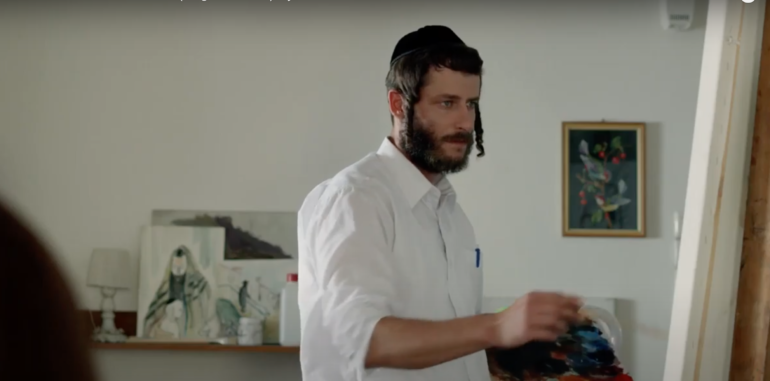
Shtisel Season 3 Episode 1 Took My Breath Away And Is Good For The Jews
Netflix brought Israeli hit TV show Shtisel back for a third season, but inconveniently released it right before Pesach, so my Shtisel season 3 watching has only just begun. I watched the first episode Monday night, and I was blown away on many levels. Twitter users have told me it only gets better! So excuse me, while I watch some television.
OK – I’ll write my thoughts down first!
A couple years ago, I wrote how Shtisel was great programming and humanized Haredi Jews more than any other TV show I’ve ever seen, but I had an issue with it in that it continued to publicize a very right wing and insular approach to Orthodoxy, perpetuating the falsehood that all Orthodox Jews live like this. (This matters, because it makes an observant life seem less appealing and attainable for many Jews less connected to their heritage who might otherwise benefit from the wisdom and meaning in an observant life. Additionally, for Orthodox Jews living a stifled life, this only confirms to them that this is Orthodoxy and they don’t get knowledge that more broad perspectives exist.) I also had a fear that with so many dysfunctional characters in the show at once (as soap operas must have), a viewer might believe this level of drama is normal for real people – again, pushing away less observant Jews, reinforcing what Orthodox Jews raised in abusive situations already believe to be the sole truth, and inciting antisemites.
Episode 1 of Season 3 introduced something new and wonderful in the show. Minor spoiler alert coming:
It showed an older Haredi character being abusive and some younger people in the show standing up to him. While the Haredi world has made numerous advances in the area of preventing abuse and confronting abusers, we are not there yet in terms of the ideal state. At the same, there is a growing trend of younger rabbis and community leaders being more educated on best practices for keeping kids safe and implementing those practices. Additionally, there was a racist sentiment from a character in the episode, and again, other Haredi characters pushed back on this perspective. Unfortunately, this doesn’t always happen, but I believe it’s happening more and more.
Of course there are real life situations, as depicted in shows like Unorthodox and lived by many members of Makom where the bad guy wins and the only way to be around reasonable people is to get away from those causing harm. The problem is that having this narrative repeated over and over again, with no context that many parts of the Orthodox world are in fact healthy and thriving, leads to a skewed belief that dysfunction and extremism is the way of all Orthodox Jews. This then implicates all Jews. One of our fans recently described this phenomenon:
I’ve traveled a lot, to quite a few countries…when the word Jewish is used to describe my religion, it is almost always followed by questions about whether I’m “orthodox” or not. Why? Because the people who ask this, generally have a negative association with that word. They almost always have only heard negatives around the orthodox community. It has almost always turned into me educating people about what it means to be Jewish and how there are different levels of observance, etc. In some cases, I’ve had to defend my “Jewishness” to people that have almost always been exposed to only negatives around orthodoxy in the media which causes them to have a general bias against jews regardless of their level of observance.
While I totally understand the need for people to share their painful stories in order to be validated and to raise awareness so we can continue to work on communal issues, shows and movies that are so unforgiving to the Haredi community create an environment where Jews start to become endangered. Another fan, an Orthodox one, just posted this comment on our Facebook group:
While standing at the crosswalk, waiting for the traffic light to change, a woman came up to me and started screaming at me, “Jews are rapists, pedophiles, cheats…” Not a single person waiting with me said a word.
Only one episode into Shtisel season 3 and I see this very important dynamic taking place where the abuser or hater is confronted by other Orthodox Jews. This is happening on a communal level, and it is wonderful to see this phenemenon play out among characters in the show (in addition to this series being a masterful work of art, emotion, suspense). I must say how grateful I am that they are showing the push and pull of communal issues being addressed. I hope producers and directors creating future depictions of the Orthodox Jewish community will keep this in mind.
And with that, I have some television to watch!
If you found this content meaningful and want to help further our mission through our Keter, Makom, and Tikun branches, please consider becoming a Change Maker today.








2 comments
Sort by
I love the show. It’s awesome. I also enjoyed Fauda. The fight for Eretz.
I’m a frum Jew living in Israel and have worked in largely secular companies for just about ten years. It’s almost always a good experience in general, but it does get a bit exhausting having to be the representative of all frumkeit every time. In some capacity I’ve resigned to let people think what they want to think, which gets challenged the more they interact with me (even on a professional level).